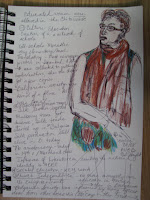

THE ODYSSEY of FULBRIGHTERS
(With apologies to Homer and all poets)
Oh ye gods and mortals
Listen to my song,
Of fourteen heroic teachers
Who journeyed to Bulgaria long.
Led by Kings Galbraith and Holtschlag
No one can resist their attack.
Already Blagoevgrad and Plovdiv
Has been totally sacked.
No murder they do or slaves they take
But much treasure they have gained.
And they hope that Delta and United
Will not give them pain.
And I a limping Homer
With aged limbs but mind still spry,
Sing their heroic song
Of the third of July.
Rosy finger dawn greets
Valiant joggers and walkers
Who after searching the city
Become coffee and tea takers.
Then to AUBG our heroes go
With the Sirens of the shops so near,
The warriors are safe -- the shops are closed,
When fair Athena does appear.
Athena, the goddess of wisdom
Disguised as Evelina in shape,
Gives kindness, knowledge, and wisdom
For wondering warriors to take.
In the middle of the lecture
Is declared a small truce
to honor an Olympian hero
Struck by the fury of Zeus.
Athena on each day
To Fulbrighters teach
But even during tragedy
To them she does reach.
But now as Prince Hamlet said
When he was Dane of the Day
I digress from the heroic tale
To sing “the play within the play.”
First in Bulgaria to appear
Were the Thracians six thousand year ago,
No script they possessed
But were skilled artisans of gold.
Mighty horsemen were the Thracians
And with the Trojans did side,
But cunning Ulysses had the bigger horse
And inside the Greeks he did hide.
Then to the land came
Macedonians and people from Rome.
Finally Bulgars, Slavs, and others
Called this land their home.
In 861 the first European kingdom
The Bulgarians do make,
But Ottomans and Byzataniums
Much of their land do take
Many Bulgarian heroes there are
Like brothers Cyril and Methodius
And great leaders like Simeon
And before him the first Boris.
But now I must return to the tale
Of Fulbrighters Michigan.
Even are admitted warriors
From Vegas and Washington.
Athena teaches the break between
Middle Ages and Modernization,
The double edged sword of
Industrial and French revolution.
The story of Europe present
Is the story of modernization,
From mass politics and media
To modern mass production.
With national revival, education
And church in place.
Bulgarian independence
Arrived in 1878.
In March Greater Bulgaria established
By the Sans Stefano Treaty
But in June the Conference of Berlin
Leave the Bulgarians needy.
Oh, those Western Europeans
Leave Bulgaria in the lee,
So Ivan the Russian
Can’t get to the sea.
The twentieth century on
The Bulgarians does crash
Each war that they fight
They end in the trash.
But bright Apollo doth one fact degree
While all Europe marches to mass hysteria
Not one Bulgarian Jew
Goes to the crematorium.
Amidst the fierce battle the Fulbrighters
Holding cups of coffee and coke,
Income the King of AUBG
And to them he doth spoke.
By way of Russia and a far away land
Called the Midwest
He came to Blagoevgrad
And at AUBG now rests.
The pride of his faculty and students
He doth joyously sing,
Now endowments and treasure
Here he must bring.
In the fall 1100 students
Call this their home-a
In the future he wants
To admit students Roma.
After the rosy fingers of afternoon
These heroic Fulbrigher ladies
Cross the quick River Styx
To the portals of Hades
There at the museum fair Hera
Disguised as Dr, Kulova,
Once again sings the heroic tale
Of the Bulgarian saga.
From independence to folk dress
Of these she doth sing
And knowledge and wonder
Once again she doth bring.
Suddenly the furies and muses
Invade the upper chamber
And Shirley of Lansing
Has them as artist do labor.
On the wildest and hottest
Of the Fulbrighters all,
She calms and teaches
Convincing them they can draw.
Thus ends this song from an aged poet
From a far and distant land
Who wonders what the Fates
Will place in our hand.
















































